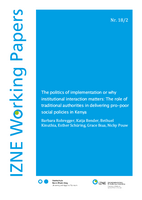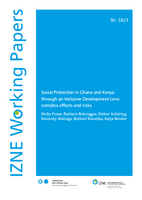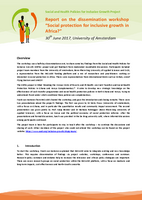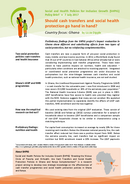Social and Health Policies for Inclusive Growth (SHPIG)
A political economy perspective on cash transfers and social health protection
Social protection is increasingly considered to be a relevant instrument for inclusive growth. This reflects a substantial change of perspective. Good health is an important component of inclusive growth. Cash transfers and social health protection share similar objectives in this regard, but the relationship between the two has not been thoroughly addressed as yet. This study aims to develop new strategic knowledge on the effectiveness of cash transfer programmes and social health protection policies in Ghana and Kenya. It focuses on the accumulation of health-related human capital and its spill-over effects on intermediate inclusive growth objectives, particularly for poor women and children. It seeks to understand if, and under which conditions, these policies are mutually complementary. The research project will extend existing research by combining cost effectiveness with political-economic considerations. This will be achieved by engaging in a multi-level and interactive process with researchers, ministries, and practitioners to coproduce knowledge.
The research questions are:
How cost effective are cash transfer programmes for the extreme poor, in general, and poor women and vulnerable children, in particular, compared to targeted social health protection policies in terms of investment in, and the accumulation of, health-related human capital and its spill-over effects on labour participation, asset accumulation and equality in Ghana and Kenya?
Under what conditions do cash transfers complement targeted social health protection policies in Ghana and Kenya?
How do the political-economy and social-cultural context at national and local levels facilitate or hinder social protection reforms in Ghana and Kenya, and how does this impact on their political sustainability?
What social protection actions and policy instruments can be co-designed and implemented to reach universal health objectives and to include the extreme poor, particularly women and children?
This study will build strategic knowledge on the integration of inclusive growth objectives into the design and implementation of social protection interventions with a focus on instrument choice and the interaction between different policies integrating technical, financial and political considerations. The study will employ a within-country comparison across time using existing household data. A political economy perspective combining a process-tracing and institutional approach will assess the factors hindering or facilitating policy change at the national and local levels. Results will be compared across countries.
SHPIG Publications
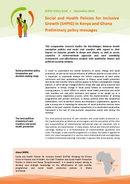
SHPIG Policy Brief No 01
Social and Health Policies for Inclusive Growth (SHPIG) in Kenya and Ghana: Preliminary p olicy messages



